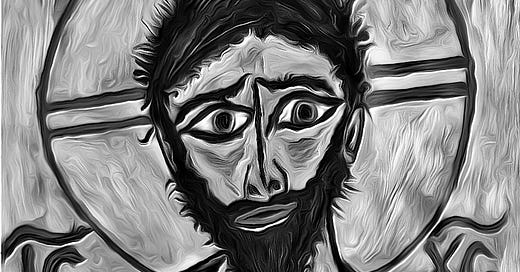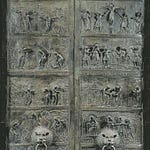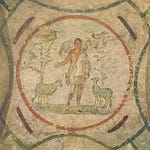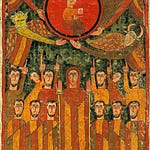NOTE: Trying something new this week, including text as well as audio for the reflections and a piece of original artwork.
Let’s begin with the first lesson — Acts 5:27-32:
When the temple police had brought the apostles, they had them stand before the council. The high priest questioned them, saying, “We gave you strict orders not to teach in this name, yet here you have filled Jerusalem with your teaching and you are determined to bring this man's blood on us.” But Peter and the apostles answered, “We must obey God rather than any human authority. The God of our ancestors raised up Jesus, whom you had killed by hanging him on a tree. God exalted him at his right hand as Leader and Savior that he might give repentance to Israel and forgiveness of sins. And we are witnesses to these things, and so is the Holy Spirit whom God has given to those who obey him.”
We should not assume that everything done in this scene is to be praised as necessary or right. In spite of what’s sometimes suggested, not everything described in Acts is prescribed by the Spirit. The apostles, including Peter, routinely get it wrong. Luke knows Israel’s Scriptures well. He knows the stories of the patriarchs, including Abraham, and the stories of the kings, including David. He knows the stories of the prophets, including Moses, and the stories of the priests, including Aaron. And he knows that these stories are far more often than not stories of vanity, corruption, faithlessness, ineptitude, apathy, overreach.
Notice: Luke does not say, as he had done earlier (in Acts 2 and in Acts 4), that Peter and the apostles are “filled with the Spirit” in their speaking. He says only that they answered their accusers. Perhaps, then, the high priest is at least half-right? Of course, the temple authorities did work with other powers to get Jesus killed. But the apostles’ words seem blunt, not incisive. What they say only enrages the council. It does not “cut to the heart” as Peter’s Pentecost sermon did.
Tellingly, the apostles do not say a word about Herod or Pilate. Even more to the point, they do not say a word about their own responsibility for what happened to Jesus. Bearing those silences in mind, it is worth pointing out, then, that they claim the Holy Spirit has been given by God to those who “obey him.” In the Gospel, however, as you may remember, Jesus says the Father gives the Holy Spirit to those who “ask him” (Lk 11:13). It is also worth pointing out that they say God desires to give repentance and the forgiveness of sins to Israel . But in his last words before his ascension, Jesus told them they would be his witnesses not only in Jerusalem and Judea but to the ends of the earth (Acts 1:8).
In today’s Gospel, John 20, Jesus breathes on the disciples, as he had breathed on Adam in the beginning, sharing the Spirit of life with them—even though they have been anything but obedient and even though they ask for nothing. This is how John tells that story:
When it was evening on that day, the first day of the week, and the doors of the house where the disciples had met were locked for fear of the Jews, Jesus came and stood among them and said, “Peace be with you.” After he said this, he showed them his hands and his side. Then the disciples rejoiced when they saw the Lord. Jesus said to them again, “Peace be with you. As the Father has sent me, so I send you.” When he had said this, he breathed on them and said to them, “Receive the Holy Spirit. If you forgive the sins of any, they are forgiven them; if you retain the sins of any, they are retained.”
“The doors of the house were locked…” The disciples, including Peter and John and the other apostles, are burrowed away in hiding “for fear of the Jews.” Their fear is all the more remarkable given what they know: they know the tomb is empty; they know the cloth that had been on Jesus’ face was left behind, neatly folded; they know Mary Magdalene has seen the Lord; they know the word of promise he shared with her for them. And yet they remain in hiding.
We’re told they fear “the Jews”—those prominent extremists and hardliners in Jerusalem and Judea who had successfully plotted and schemed to kill Jesus. That is almost certainly what they told themselves. But in truth they are not so much afraid as in dread. Not of the Jews but of the Lord. The Gospels are clear: the disciples, including the apostles, simply do not have the words for what they feel has happened. But their bodies know, because their hearts know, that whatever has happened has brought everything they have known into doubt. “Doubting Thomas,” in this regard, is anything but alone.
So, on the evening of the first day of the new creation, the doors are locked, the Gospel says, and Jesus comes and stands among his terrified disciples. He does not stand at the door and knock. He simply appears among them. We sometimes tell the story of the resurrection as if Jesus startled awake early on Sunday morning, suddenly realizing he had been dead and now is alive again. Listen to Maire Howe’s marvelous lines:
Two of the fingers on his right hand
had been broken
So when he poured back into that hand it surprised
him—it hurt him at first.
And his whole body was too small. Imagine
the sky trying to fit into a tunnel carved into a hill.
He came into it two ways:
From the outside, as we step into a pair of pants.
And from the center—suddenly all at once.
Then he felt himself awake in the dark alone.The Gospels tell a different story. They say nothing about Jesus’ inner thoughts and feelings. They tell us that the stone is rolled away only after Jesus is risen. They tell us the stone is rolled away for show, so the guards and the disciples can know for a fact that something impossible has happened—something impossible indeed. They tell us that Jesus left the tomb where he had been buried the same way he arrives in this room where the disciples have barricaded themselves. Then, he disappeared. Now, he appears.
Well, that’s not quite right. We can’t speak of the “then” of the resurrection—as if it happened at a particular moment in time, a moment that could be timed. The resurrection happened not in time but to it. The risen Christ, they’re told, is no longer in the tomb: “Why do you seek the living among the dead? He is not here.” But what they soon discover is that he is in the tomb because the tomb is in him.
As Robert Jenson says in his Large Catechism, “there is no spatial separation to overcome between the embodied Jesus ‘in heaven’ and the loaf and cup on the altar” of Communion. Why not? Because “the question of Christ’s bodily presence at the Supper is… not a question of getting from one place to another but of availability to us in the places where he chooses to be found and directs us to seek him. All places are one in their accessibility to him.” And so are all times.
As I’ve just said, the events of Christ’s life—his birth, his baptism, his death, his resurrection—happen not only in time but to it. The Christ who appears in the locked room to those frightened disciples is the same Christ who appears in the sealed fountain of the virgin’s womb. It his resurrection, his disappearing from the sealed tomb, that fuses the events of his life into the transfiguring presence at work at the deepest depths of history. Rahner gets this exactly right, I think:
The purpose of [Jesus’] life is perfectly accomplished in his resurrection… The whole Christ with his whole destiny and with everything he experienced and suffered on earth with his human nature, has now entered into the glory of the Father. The glorification of his body is not something accidental—a second thought, but it is given to him because he has attained the great end and purpose of his history. That is so true that everything that he was in course of his history has entered into the glory of the Father. Jesus has not lost a thing… He possesses his life completely… He took his whole life and everything in it with him into glory… The resurrected, ascended Lord is the end of the ages! He is the heart of the world!
This, and nothing less than this, is what we proclaim when we proclaim the resurrection. Jesus, the one who lived that life that began in Mary’s belly and died that death outside Jerusalem’s walls, is the infinite, eternal source, guide, and goal of created existence. His life is the life of all that is good and true and beautiful. His death is the death of all that’s opposed to creation’s flourishing. Nothing but what he does and wants done will matter at all in the end. As St Maximus said in his Centuries on Theology and Economy: “He who is initiated into the inexpressible power of the Resurrection apprehends the purpose for which God first established everything.”
The New Testament reading for Sunday is Revelation 1:4-8. It opens with John’s identification of Jesus as “the faithful witness, the firstborn of the dead, and the ruler of the kings of the earth.” It closes with Jesus’ own words: “‘I am the Alpha and the Omega,’ says the Lord God, who is and who was and who is to come, the Almighty.” The order of these identifications not insignificant. Jesus is the ruler of the kings of the earth only as the firstborn of the dead. And he is the firstborn of the dead only as the faithful witness, the one who did not cling to life even in the face of death. His dominion, in other words, is the outworking of resurrection life in the whole of the cosmos, so that every creature not only exists but breathes with the breath of God—fulfilling the promise of the last line in the last Psalm. “Let everything that has breath praise the Lord” (Ps. 150:6). And everything, truly everything, does have breath, God’s breath.
In Revelation, Jesus’ dominion is the dominion of peace and thanksgiving, a peace he brought about not by spilling the blood of God’s enemies but by drinking for them the cup of the unmixed wine of God’s wrath. He is the LORD, John reminds us, the Almighty. But it is because he is the Almighty, the one from whom, and through whom, and for whom all things exist, that the report of his resurrection is “gospel”—a goodness that spells the world into the fulness of peace and joy. Jenson is right: the good news is good news not because a resurrection has happened but because Jesus is risen.
In the Gospel reading, when Christ appears, he speaks peace over the disciples (as before he had spoken peace over the waters). He needs to speak peace because they are in dread—of him! And of what he has wrought. He has stripped the world of its orderliness, its predictability, its purpose. They are left undone. It is only after he shows them his hands and his side that they rejoice. In fact, read closely: they do not even see him until he shows them his hands and his side. And then he breathes the Spirit on them, after having passed the peace a second time. So, despite what Peter and the apostles suggest to the high priest in the temple courts, they received the Spirit not because they obeyed, not because they even knew enough to ask for the Spirit, but simply because Jesus loved them and kept showing up for them until that love caught hold of them.
Obviously, your story is different from mine and our stories are different from the apostles’. But not so different that we can’t learn anything from them. I suspect that at least some of us are locked away right now, grieving what we’ve lost or terrified by what may come. Others of us are spoiling for a fight, seething with righteous (or not-so-righteous) indignation, eager to bring Jesus’ blood down on those we know are in the wrong. Most of us, I suspect, veer back-and-forth between that sealed-off room and the temple court. One moment, engaging this person, we are nervous and self-protective. The next moment, engaging that person, we are brutal and vindictive.
But here’s the good news: if you’re in hiding, Jesus will appear to you and make himself known to you so that you’re filled with God’s own joy. He does not even need you to open the door. And if you’re on the warpath, if you’re out crusading, Jesus will afford you all the time and space you need to discover not only that your violence can never accomplish his peace but also that his peace will always triumph over your violence—first for those you’ve wronged and then, when you’re ready, also for you. He can do that because he is risen as the heart of the world. Time is his. History is his. You are his.
Last week, after I shared my latest health update, a dear friend of mine, Bill Oliverio, sent me a text. He ended with these words, which were for me straight out of the mouth of Jesus: “Peace, strength, rest to you. Everything will be here waiting.” That is the word the Spirit of God makes mine and yours. That is the word we can speak to ourselves and to others—including those powers that are opposed to God. This is what it means to trust that Christ is risen as the heart of the world. Jesus has all the time in the world for us. We have all the time we need to get this right. So, we never need to press ourselves or anyone else for an outcome. Everything will be here waiting.
Everything will be here waiting.















Share this post